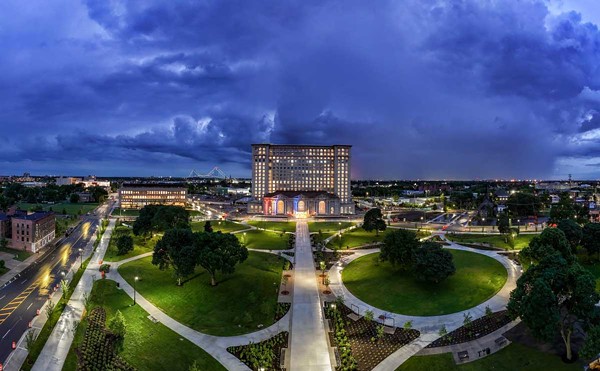It's like a hot day in the Antarctic: I actually find myself agreeing with the Bush administration. They're right when they say that criticism of the UAE port deal is based largely on racism (I would have said xenophobia, but that has too many syllables for Bush).
It's sad to see so many in Left Blogistan jump on the story the way they have. By focusing on the narrative that it's dangerous to allow scary, swarthy Ay-rabs to operate our ports, we're missing a great opportunity to educate the public about one of the hottest controversies in the debate over trade, which I'll get to in a moment.
Of course, everyone's quick to point out that they're not at all motivated by bigotry. Blogger Steve Gilliard (stevegilliard.blogspot.com) wrote, "When the UAE, a country which defines the word shady, wants to run U.S. ports, we're bigots for opposing this? I have no problem with Arabs. I have a problem with people who enable terrorists." He adds, "Hell, just because 9/11 was planned in Dubai, they couldn't mean us any harm, right?"
That doesn't stand up to scrutiny. If it were a German company — 9/11 was planned there as well — nobody would say "boo" about this deal. As the Wall Street Journal points out, "Yes, some of the 9/11 hijackers were UAE citizens. But then the London subway bombings last year were perpetrated by citizens of Britain, home to the company (P&O) that currently manages the ports that Dubai Ports World would take over." (My agreeing with the WSJ makes it two scorchers in Antarctica for those counting.)
Don't get me wrong: I take as much pleasure in seeing the GOP getting its knickers in a twist over this as the next guy. What sweet irony it would be if George "I'm A War President" Bush were to exercise his very first veto to kill a Repub-sponsored bill to quash the port deal.
And if that plays out, it'll have a huge impact on our national discourse, giving the media the go-ahead to start pushing on the Bush-is-a-lame-duck storyline a year before its natural ripening.
And it's a great opportunity to talk about something I've written about in the past, the fact that conservatives refuse to invest adequate resources in pragmatic security measures like container inspections because it gets in the way of giving the boys down at the club a nice tax break.
But if you want to play on people's fears of The Insidious Plot to Create a New Islamic Caliphate, count me out. I'm on record opposing racial profiling when the New York City cops instituted their stop-and-check subway policy, writing:
Islam is a religion. It has no identifying mark, and it doesn't accord to skin tone or nationality. ...
Richard Reid wasn't "Arab or South Asian." Neither was Jose Padilla. Neither was John Walker Lindh.
Padilla and the others are simply proof that you can't hope to judge a book by its cover. If we're only checking Arabs and Central Asians, a sophisticated international terrorist could easily adopt a disguise — dress up as an orthodox Jew or a Puerto Rican — and walk right by security in New York City.
I sure would be a hypocrite to now argue that an entire nation of 2.5 million people poses a security threat. Is it really any more likely that a multinational corporation based in the UAE will let terrorists sneak in than a British company? Remember, they're not taking over port security; the deal is for port operations — running the cranes and whatnot.
That doesn't mean that there isn't plenty to criticize about this contract. First, it looks like the cronyism that's become par for the course in this administration may have come into play on the deal. As the New York Daily News reported, Dubai Ports World — the company in question — has at least two ties to senior officials in the Bush administration. Now that this is a story that people are digging around, I bet that we see a long article pop up in the next week about who lobbied whom to get this contract done.
But the bigger issue here is how this story perfectly illustrates the corporate-logic-as-public-policy behind "free-trade," and how every Democrat who hides behind that euphemistic banner and is now whining about this deal should have their noses rubbed in it.
This deal is about government procurement, one of the hottest controversies in the trade debate, but one of which the general public is largely unaware.
The United States, European Union and Japan — the dominant service economies — have been pushing hard to get a deal done on government procurement that would bring public purchasing of goods and services into the World Trade Organization framework. Their goal is to give foreign-based multinationals "national status," meaning that governments couldn't favor domestic firms over foreign firms for any reason (except for security issues, and this case wouldn't be likely to qualify as such).
Let's assume that this UAE port deal was the best one out there — that they offered the lowest bid among highly qualified firms. Under the framework that the United States has been pushing, it would be a sanctionable violation of WTO rules to discriminate against the company because it's based in the Middle East.
In theory, that sounds like a fair trade deal — and, as I've made clear, I don't see the security threat here. But the problem is the issue writ large: Governments use procurement — the spending of tax dollars — for purposes that defy pure considerations of economic efficiency. Here, for example, we would be discriminating against a qualified firm because the deal makes our citizens and our lawmakers uncomfortable. In a free society, that should be enough reason right there. We're a sovereign nation.
But that's not the logic being pushed, in our name, during trade negotiations. Consider the Massachusetts Burma Law, about which I've written before, that put pressure on Burma's military junta by giving preference for state contracts to companies that didn't do business with that country. It was killed in the federal courts after the European Union and Association of Southeast Asian Nations filed complaints against the United States with the WTO. And there wasn't even a binding agreement on government procurement then; they said it "violated the spirit" of the WTO.
Similarly, the sanctions against apartheid South Africa would have been WTO-illegal if the organization had existed at the time.
It's a very small step from there to saying that governments can't favor minority-owned businesses or women-owned businesses or firms that pay a living wage to their employees. All of those criteria could be challenged as nontariff "barriers to trade" by firms from countries that don't have similar rules, or like populations.
Now consider a poor country's perspective. Government purchasing can be a crucial tool for development. Currently, governments steer business to domestic "infant industries" that haven't yet achieved the economies of scale needed to compete with foreign multinationals. That would be impossible if a government procurement deal is made in the shape that our trade negotiators want to see it.
This is about subjecting governments to the same criteria that the private sector uses: efficiency, cost-containment, etc. It happens all the time, it's the consistent goal of those who represent us in trade negotiations, and it's wrong. So let's skip the xenophobia and talk about the larger issue here: democracy versus corporatism.
Joshua Holland is a staff writer at AlterNet, which publishes progressive stories online at alternet.org. Send comments to [email protected]




